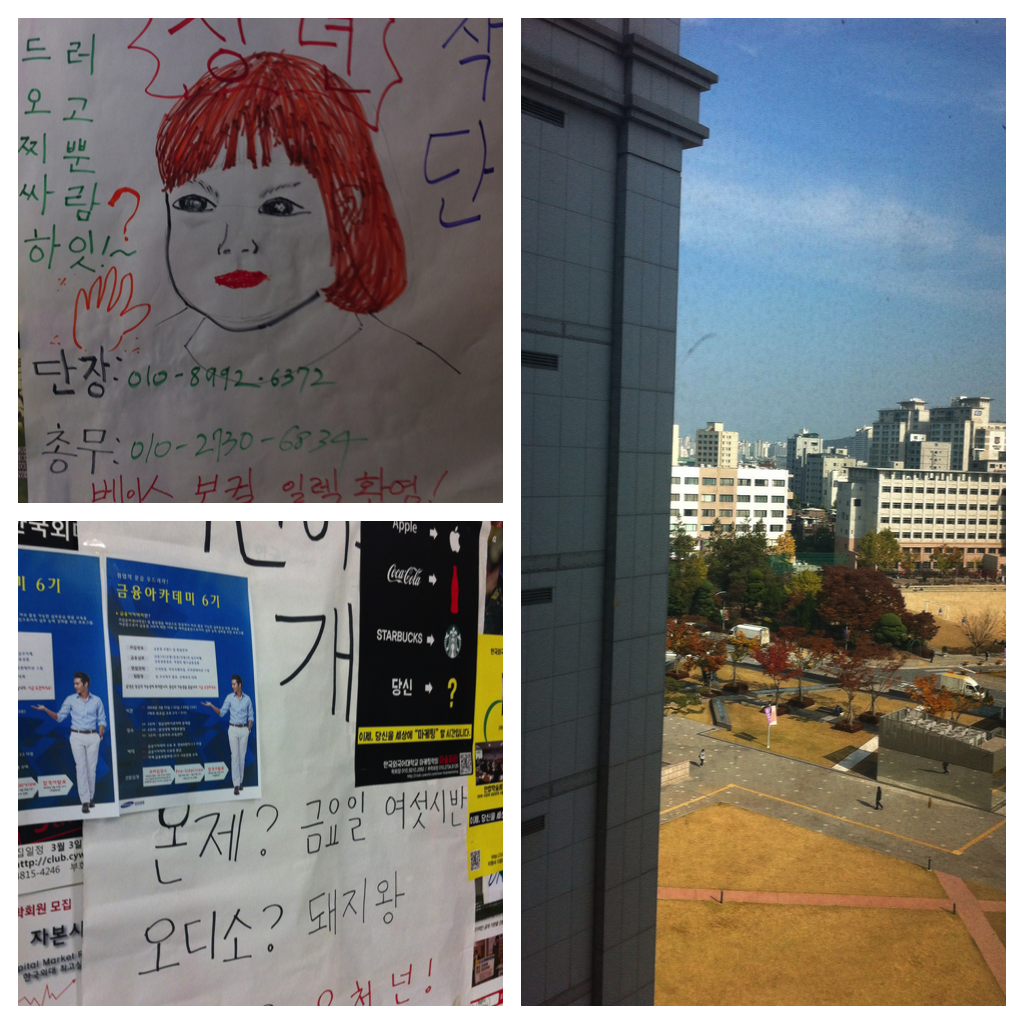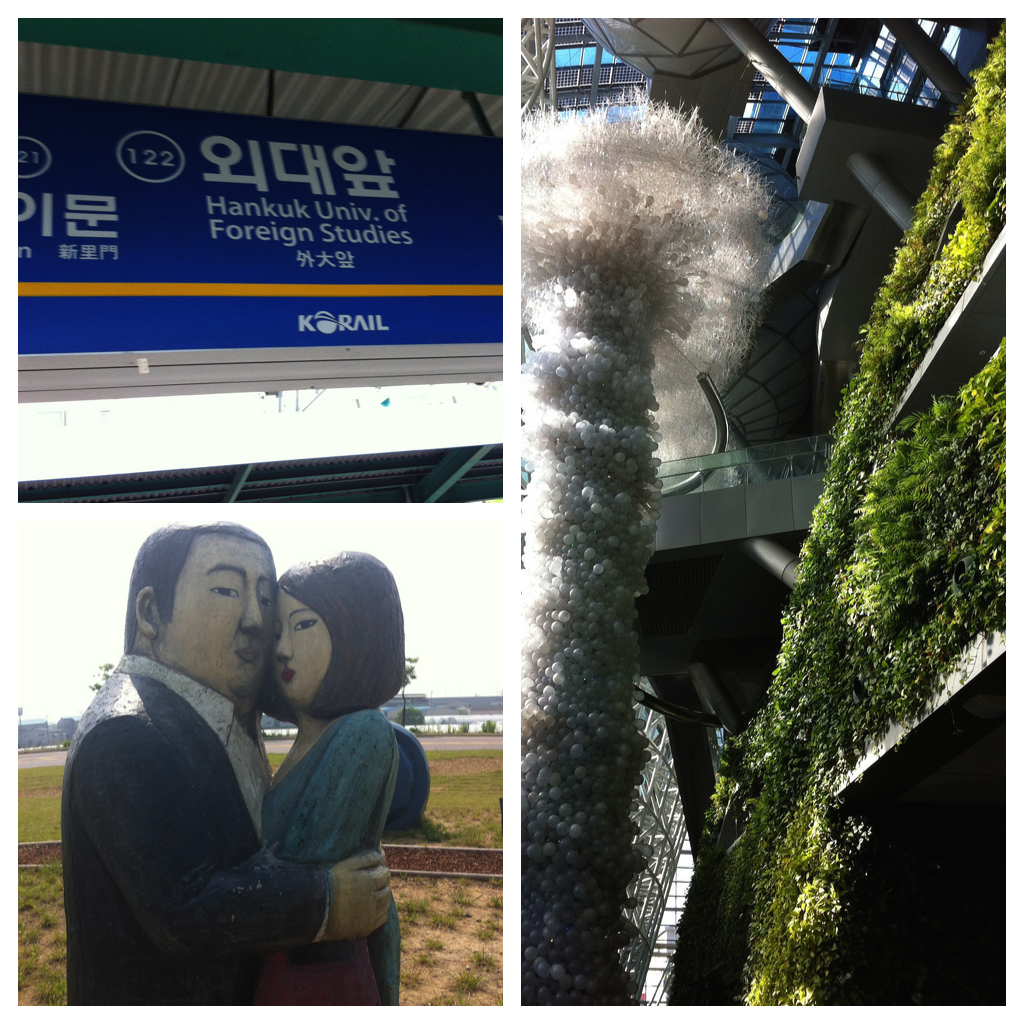I am just finishing the second semester of my time at Hankuk University of Foreign Studies in Korea and I wanted to take a moment to reflect on what I have learned. I had spent the last six or seven years before this year pulling away from teaching. I worked in a variety of roles on the peripheries of education, mostly in supporting higher education. I conducted workshops and seminars and all that, but I hadn’t had such an extended engagement with students for quite some time. It came at a time in my life when I didn’t expect to be teaching again. It just sort of appeared. It fell in my lap through a colleague. I never resisted it per se; it just caught me a little by surprise.
More importantly, the last two semesters have challenged many many things in regards to how I constructed my own identity. It augmented certain traits I had acquired outside academia. It obliterated any assertions I had of Korean students. It was a year of growth, both professionally and personally. It was a year where I let my ego calm itself down a bit; where I settled into just doing the work. The work of educating. I am drawing from this experience a few different takeaways which I am presenting below. I doubt much of this will be new for those teachers out there. I just think it is positive every so often to stop and reflect on how honored a position this is. How much power and purpose it has. So on we go.
Identity shift
I noticed a subtle shift over the past year in my identity as an academic. I slowly gravitated from researcher to teacher. I am always both, or at least have been for the last decade or so. But now I am decidedly in the teaching camp. My research now stems from my teaching, my interactions with other teachers and my own students, pedagogical concerns, searching for new ways to teach. This was an unlikely transition, I thought, considering how I am approaching the last run at my PhD (aiming for an early 2015 finish). It felt, at least my interactions with my network influenced me into thinking it should feel, as though I was establishing my identity as a researcher first and foremost. I have been conducting some form of research, more or less, for the last ten years and have become more and more comfortable with it. I have been allowing it to overtake my professional identity a bit, but now it is shifting back to teaching. I don’t mind the shift at all; in fact, I am enjoying it. I just wasn’t expecting it. Especially as I am gearing up for a run at academia post-graduation. If it doesn’t work, that is fine, but I should give it an honest effort.
This was made very visible to me at the few conferences I attended this year. I found I was introducing myself as “I teach at Hankuk University of Foreign Studies in Seoul” followed by what types of courses I teach, followed by what types of students I teach (undergraduates, mostly juniors or seniors), and then maybe my research on Pedagogy of Simultaneity (as that is teaching and learning research), and then maybe my PhD research. I had reorganized the verbal resume to greatly emphasize the teaching bit at the obvious expense of my identity as a researcher. I don’t think that was accidental, however unconscious it was.
I like research. I love it, actually. But I love teaching more. I am at a stage where I don’t enjoy conferences all that much, but I love workshops. I don’t love research that is driven by its own momentum, but I do love research that emerges from real-world environments, most notably my classroom. I like this identity shift.
Teaching is Tension
I should expand on that title. Teaching is a tension between many things. Between input and output, between isolation and socialization, between composition and reflection, between process and activity. I see teaching (and course design and curriculum design) as a supremely political, social, cultural and creative act. It is the process of funneling all the truths of the field/world and activating it for others through process and activity. There is a high degree of tension in this process and that is a perfectly reasonable expectation. I have noticed that the tension in my teaching is the edgy balance between creativity (or novelty) and process or practice.
And this all boils down to recycling, reuse, or reinvention. I have had lessons work in the past that I have completely discarded and built again from scratch. I have recycled individual parts of an activity or an individual method for achieving a desired outcome, but I have never taught the same lesson, at least not in recent memory. I completely reinvent my courses each semester. From scratch. I am guided by my previous efforts and encouraged by their results, but I need to be better. I need to reinvent it each and every time. It is that act of creation that keeps me on my toes; it allows me to walk into a classroom after 10+ years of teaching and wonder, or whimper, to myself if this is going to work. Sometimes it works because it was designed that way, sometimes it works because I scrapped it midway when another learning opportunity presented itself, and sometimes it works because I just forced it through with stagecraft (teaching as an act of performance). Sometimes it doesn’t work. And I get angry at myself afterwards. But then I reinvest in myself and in the lesson by fixing it. From scratch.
This is a standard that I set for myself. I am, however, perfectly open to the suggestion that reinventing the whole thing each and every time is not necessary. But it is necessary for me. The tension in all of this fuels my work and that level of desperate enthusiasm that I bring to the classroom rubs off on my students (I believe). They know something is different here and they give me the benefit of the doubt. We collaborate on these things. I have learned over the past two semesters at this university is that I use less and less of a safety net (in terms of relying on what has worked in the past) each and every lesson. And when I referred to desperate enthusiasm (in a good way) before, this is more or less what I meant:
Tracked steps via mobile app while teaching (8hrs) yesterday. Verdict: teaching=exercise. 14,000+ steps; 7+miles. Circulate, people.
— Michael Gallagher (@mseangallagher) May 28, 2014
Teaching and Tools
The other part of this teaching transformation that I embraced was the mastery of tools. I ascribe to Saljo’s (1999) idea that the use of tools is a piece of a “larger process of coming to know, a process whereby meaning is constructed through the use and mastery of a number of different tools, technological, intellectual, and physical.” In my role as teacher, it is my responsibility to become familiar with these tools, to constantly tinker with their optimal arrangement (in my process of coming to know, which is, oddly, a process designed to help my students find their process of coming to know). Towards this end, I have been reflecting here all year on the use of blogging tools, or course management tools (in the very disaggregated sense), or even scheduling and course communication tools.
All of these tools inform my thinking, but they are all pieces of a larger puzzle. I had a need and went looking for a tool. I didn’t have a tool in search of a need. The direction of that flow is important. I don’t use the university LMS aside from hosting my course content. I don’t want my or my students’ learning paths to be boxed in. I want a free flow of course activity. I want students to use their own spaces if at all possible, or to find a space and make it their own. I just want a simple RSS feed to track it all. I became acutely aware of the fact that it is my responsibility as a teacher to become familiar with these tools, what is made possible by them, and what their limitations are (and how they can, if one is not careful, dictate process and output). These are my professional expectations.
This is also where I also feel that the emphasis in many universities on research over teaching falls apart. I know many universities are perfectly resigned to poor teaching in favor of consistent research. Both indeed are possible, surely, but we cannot pretend, not for one second, that teaching is not a highly involved, highly creative act. Familiarity, relevancy, topicality, research, activity, process, objectives, tools, compositions: it is a perfect storm of a learning intersection. This all requires attention. Lots of attention. One cannot take their eyes off the road; you can only invest and trust in the other drivers (students).
Fertile Fields and Unexplored Territories
The task of the modern educator is not to cut down jungles, but to irrigate deserts. C. S. Lewis
I might suggest to C.S. Lewis that the task of a modern educator is to do both. Parts of learning are about reorganizing space, manipulating it towards learning effect. I am not sure I would say cutting down jungles, but rather perhaps carving out niches, or spaces, or vantage points. The second part I am more taken to, to be honest, but it flows from the first. I like the idea of foraging into new territories, to exploring new ideas and concepts in novel ways. I am blessed enough to have students who are willing, if not eager, to explore those with me. I believe that I cannot pretend to know the world that they will live through, nor how this education can prepare them pragmatically for any particular work-related task they might experience. But I do know something that might be of value to them. Rather than expand on these, I am just going to list them to spare your patience.
- The ability to create learning and knowledge from ubiquity is and will always be a highly useful skill. To manipulate everything to create something.
- The ability to cast previous understanding aside in the face of a new context is a social, biological, even evolutionary advantage. To know that my past might inform, but will not dictate my future.
- The ability to meaningfully (and peacefully, i.e. not tearing yourself down) reflect is the greatest of all virtues in a highly ephemeral world.
- Resilience and curiosity are usually enough for any learning scenario, anywhere. These two are the foundations of a successful, and, in my case, satisfied life. I never know all that I want to know and I am never defeated by what obstacles are put in front of me as I try to learn what I want to learn.
- Beauty, laughter, appreciation, humility, and awe are the trademarks of a mature individual. We should feel these each and every day.
- Since I have embraced in a career what satisfies me in this life (curiosity, learning, inquiry, process, composition), I have never worked an actual day in my life. It is what I would be doing with or without this job. I only hope my students are this lucky.
As I said, a good year.



[…] I am just finishing the second semester of my time at H… […]
[…] merely on authority of rank, title, content knowledge, or even experience. I had reflected on this a bit in a previous post. I personally try to completely rework my lessons each and every semester. From scratch. I openly […]